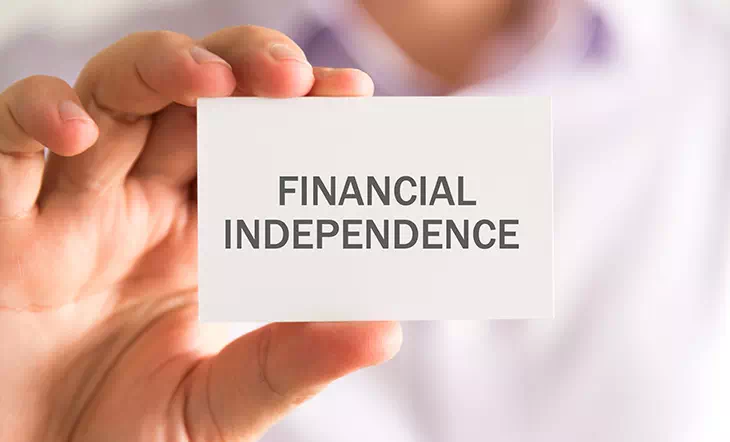Achieving Financial Independence: Your Roadmap to Freedom and Security
In our rapidly changing world, the pursuit of financial independence has become a crucial goal for many. Financial independence, or FI, goes beyond mere financial stability; it embodies the ultimate freedom to live life on your own terms without the constant pressure of earning a paycheck. This blog delves into the concept of financial independence, outlines the steps to achieve it, and highlights the benefits it offers.
Understanding Financial Independence:
Financial independence is the state of having enough personal wealth to cover your living expenses without relying on active employment. It grants you the liberty to make life choices based on your preferences rather than financial constraints. Whether it’s early retirement, traveling the world, or spending more quality time with loved ones, financial independence makes it possible.
Steps to Achieve Financial Independence:
- Define Your Vision:
Clarify what financial independence means to you. Determine the lifestyle you desire and calculate the amount of money needed to sustain it.Establish financial goals that cover both the near future and the long haul. - Craft a Budget:
A well-structured budget is essential for financial management. Monitor your income and expenditures, identify unnecessary expenses, and allocate funds towards savings and investments. - Prioritize Saving and Investing:
Saving is fundamental to financial independence. Aim to save a significant portion of your income consistently. Invest these savings in diversified portfolios, including stocks, bonds, real estate, and mutual funds, to grow your wealth. - Reduce and Eliminate Debt:
Debt can impede your journey to financial independence. Focus on paying off high-interest debts first, such as credit cards and personal loans. Avoid accumulating new debts unless necessary. - Develop Multiple Income Streams:
- Enhance Financial Literacy:
Educating yourself about personal finance and investment strategies is crucial. Read financial books, attend workshops, follow credible finance blogs, and consider consulting a financial advisor. - Adopt a Long-Term Perspective:
Benefits of Financial Independence:
- Freedom of Choice:
Achieving financial independence grants you the freedom to make decisions based on your passions and values. Whether it’s pursuing a dream project, spending more time with family, or exploring the world, the choice is yours. - Stress Reduction:
Financial security significantly reduces stress and anxiety related to money. Knowing you have a financial safety net fosters peace of mind and enhances overall well-being. - Potential for Early Retirement:
Financial independence opens the door to early retirement. Imagine stepping away from the traditional workforce years ahead of schedule and enjoying life without financial worries. - Pursuing Passions:
With financial independence, you have the resources and time to engage in activities you love, start new ventures, volunteer, or dive into hobbies. - Building a Legacy:
Financial independence enables you to create a lasting legacy for your loved ones. You can establish generational wealth and provide financial support to ensure their security and opportunities.
Conclusion:
Financial independence is an achievable goal for those willing to plan, save, and invest with discipline. It offers a pathway to a life filled with freedom, security, and personal fulfillment. By setting clear goals, managing your finances wisely, and staying dedicated to your plan, you can achieve financial independence and enjoy its numerous benefits. Begin your journey today and experience the true freedom that financial independence brings.
FAQs:
1. What does financial independence mean?
Financial independence means having sufficient wealth to cover your living expenses without needing a regular job. It gives you the freedom to make life choices based on your desires rather than financial constraints.
2. What are some common challenges in achieving financial independence?
Common challenges include managing debt, unexpected expenses, market fluctuations, and maintaining discipline in budgeting and saving. Overcoming these obstacles requires resilience, planning, and adaptability.
3. What are the initial steps toward financial independence?
Begin by evaluating your current financial situation. Create a detailed budget, prioritize paying off high-interest debts, and start saving and investing a portion of your income. Setting specific financial goals and learning about personal finance are also key steps.
4. How can I develop multiple income streams?
Look into various opportunities like investing in the stock market, purchasing rental properties, starting a side business, or taking on freelance work. Having diverse income sources enhances financial stability and speeds up your path to independence.
5. Why is budgeting important for financial independence?
Budgeting helps you track your income and expenses, find areas to cut costs, and allocate money for savings and investments. A well-structured budget is essential for achieving financial independence.
6. How does investing contribute to financial independence?
Investing is crucial because it allows your money to grow over time, surpassing inflation and building wealth. Diversifying investments across stocks, bonds, real estate, and other assets significantly aids in reaching financial independence.
7. How does financial independence impact my lifestyle?
Financial independence offers the freedom to design your lifestyle according to your preferences. It reduces financial stress, allows you to pursue passions, and gives you more control over your time and decisions.
8. How can I stay motivated on the path to financial independence?
Stay motivated by setting achievable milestones, celebrating small successes, and regularly reviewing your progress.
9. Is financial independence the same as early retirement?
Not exactly. Financial independence means you can live comfortably without working, but early retirement is the choice to stop working entirely. Some people achieve financial independence but continue to work on projects they are passionate about.
10. Can I achieve financial independence on a modest income?
Yes, it’s possible to achieve financial independence on a modest income with disciplined saving, smart investing, and careful budgeting. Living below your means and making strategic financial decisions are key.





